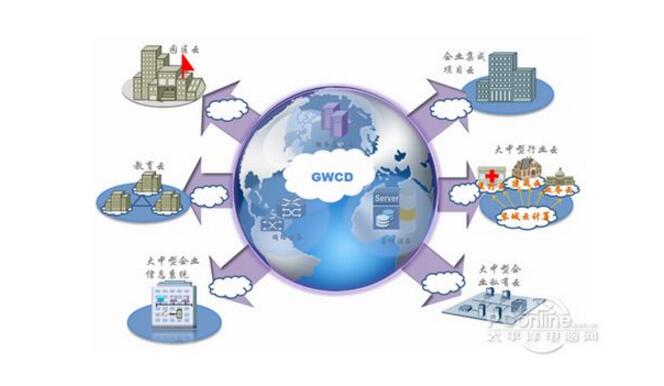Cloud computing is a mode of increase, use, and delivery of related services based on the Internet, and generally involves providing dynamically scalable and often virtualized resources through the Internet. Cloud is a metaphor for the Internet and the Internet. In the past, telecommunications networks were often represented by clouds in the diagram, and later used to represent the abstraction of the Internet and underlying infrastructure. Therefore, cloud computing can even allow you to experience 10 trillion operations per second. With such a powerful computing capability, you can simulate a nuclear explosion, predict climate change and market trends. Users access the data center through computers, laptops, and mobile phones, and perform operations according to their own needs.

(1) Very large scale
"Cloud" has a considerable scale. Google Cloud Computing already has more than 1 million servers. Amazon, IBM, Microsoft, Yahoo, and other "clouds" all have hundreds of thousands of servers. Enterprise private clouds typically have hundreds of thousands of servers. "Cloud" can give users unprecedented computing power.
(2) Virtualization
Cloud computing allows users to access application services at any location and using various terminals. The requested resource comes from the "cloud" rather than a fixed tangible entity. The application runs somewhere in the cloud, but in reality the user does not need to know or worry about the specific location of the application. Only need a laptop or a mobile phone, you can use network services to achieve everything we need, even including such tasks as supercomputing.
(3) High reliability
"Cloud" uses data multi-copy fault tolerance and compute node isomorphism interchangeability measures to ensure high reliability of services. It is more reliable to use cloud computing than to use local computers.
(4) Versatility
Cloud computing does not target specific applications. Under the support of “cloudâ€, it is possible to construct ever-changing applications. The same “cloud†can support different applications at the same time.
(5) High scalability
The scale of "cloud" can be dynamically scaled to meet the needs of applications and user scale growth.
(6) On-demand service
"Cloud" is a huge pool of resources that you buy on demand; clouds can be billed like tap, electricity, gas.
(7) Extremely cheap
Because the cloud's special fault-tolerant measures can use extremely inexpensive nodes to form the cloud, the automated centralized management of the “cloud†eliminates the need for high-cost data center management costs for a large number of enterprises, and the universality of “cloud†makes resource utilization possible. Compared with the traditional system, the user can fully enjoy the low-cost advantage of the “cloudâ€. It often takes only a few hundred dollars and a few days to complete tasks that previously required tens of thousands of dollars for months.
Cloud computing can completely change people's future life, but at the same time, they must also pay attention to environmental issues so that they can truly contribute to human progress instead of simple technological advancement.
(8) Potentially dangerous
In addition to providing computing services, cloud computing services must also provide storage services. However, the current monopoly of cloud computing services is in the hands of private organizations (enterprises), and they can only provide commercial credit. For government agencies and commercial institutions (especially banks that hold sensitive data like this) should be vigilant enough to choose cloud computing services. Once business users make large-scale use of cloud computing services provided by private organizations, no matter how strong their technological advantages, it is inevitable that these private organizations will control the entire society with the importance of “data (information)â€. For the information society, "information" is crucial. On the other hand, the data in cloud computing is confidential to other users of cloud computing users other than the data owner, but there is really no secret for commercial organizations providing cloud computing. All these potential dangers are an important precondition for commercial organizations and government agencies to consider when choosing cloud computing services, especially cloud computing services provided by foreign institutions.

1, expand emerging markets
A single cloud is also very important for emerging markets. In some backward areas, such as Africa, the infrastructure of many Internet companies does not enter those areas. Not only are they lacking data centers and professional on-premises IT, some places do not even get a stable internet or wifi.
In these impoverished areas, cloud computing will probably be the technology that they will use to connect to the Internet in the future, which will help the rapid development of the local area and Chen’s drive for Internetization.
Today, many start-up companies have already successfully entered some regions. This trend will continue and will promote the realization of informatization.
2, conducive to start-up companies
For start-ups, cloud computing can be a great boon because it allows for purchases based on the needs of business users. Run business at a small cost. This allows start-ups to focus on their innovation without having to worry about cost.
At the same time, cloud computing can quickly and easily implement extended requirements. From one employee to dozens or even more, it is easy to meet and help start-ups grow more flexibly.
Of course, when your needs are small, you can also reduce your demand.
3, fast-paced market, forcing innovation
The cloud computing market is developing very rapidly. All the major IT vendors are clamoring for a share, which promotes the pace and innovation of the IT market. Instead of maintaining a fixed product update cycle every year, they are motivated to rapidly develop in a short period of time and bring newer features to users.
For companies using cloud computing, they will also ensure that they use the technology and features, as well as the price reduction, which is beneficial to the company.
In the past few weeks, many companies are fighting a price war. It is believed that prices will gradually decline to an acceptable level with this rapid innovation.
4, anytime, anywhere access
When you travel or vacation, you can leave your office with your notebook. You can handle your work as long as you have a network.
Today's executives and employees are capable of working with outstanding processors from anywhere, and cloud service providers such as Microsoft, sap, salesforce and Google can not only support the work of laptops, but also support the use of smartphones and tablets. .
This idea has been adopted by many big names, such as Coca-Cola, and their employee-customized mobile phones are pre-installed in cloud services. And this trend is inevitable and will continue.

1. Cost savings: By adopting cloud computing technology, companies will be able to outsource data escrow and software applications using a company's simple, low-cost computers. In addition, the use of applications provided by cloud computing service companies can also help companies reduce or save operating costs, such as cloud hosting, firewall security protection costs, human resources costs of software development, and costs associated with on-site software and hardware repair and maintenance.
2. Expand the business scale on the basis of existing resources: By outsourcing hosting and application services, companies need not to invest in additional operations while increasing their operations scale, and at the same time, they need not increase their manpower to save further costs; in addition, when the business is in trouble, The company can contract out part of the business without dismissing employees.
3. Pay according to usage requirements: The company can pay outsourcing cloud computing service fees according to the frequency of service usage, and regularly pay a small amount of information hosting fees. In this way, companies can reduce expenditures during difficult times and reduce marginal costs during business growth.
4. Freedom to choose the level of protection required: Cloud computing technology can provide enterprises with higher reliability and availability of backup services, especially for small and medium-sized enterprises, compared with the internal servers. With this technology, service providers can use their own strengths or collaborate with other companies in the same industry to provide the necessary hardware and virtual redundancy features to ensure that any customer's availability and reliability requirements are met.

The giants are building cloud ecosystems based on “I†and strengthening their control over the cloud computing industry. Alibaba Cloud promoted the Cloud Alliance program and plans to recruit 10,000 cloud service providers to jointly build an ecosystem to provide one-stop cloud services for enterprises, governments, and other users.
Tencent Cloud released "Cloud + Plan", and invested 10 billion yuan in five years to build a cloud platform and build an ecosystem to attract long tail companies in the cloud computing industry chain. Inspur launches the “Yun Teng Plan†and plans to develop more than 3,000 partners within three years. Huawei Enterprise Cloud has reached cooperation with more than 100 domestic industry-leading partners and more than 20 cities to expand industry application and computing capabilities.
LeTV Cloud publishes six scenarios: cloud resources, cloud video, cloud applications, cloud distribution, cloud marketing, and cloud data. It strives to create a video cloud ecosystem and build a business value chain and ecosystem that is deployed on the cloud for content, distribution, and even users. Baidu launched the "Cloud Map Project" and joined hands with industry partners to build an ecosystem. It plans to invest 10 billion yuan to build Baidu's cloud platform and ecosystem within five years.
Cloud ecology may become a symbol of the competitiveness of the cloud computing industry. In 2017, various manufacturers will substantially promote the construction of cloud ecology, and more cloud computing companies will also launch cloud ecology strategies.
Trend 2: The price war will speed up the survival of the fittest for cloud computing companiesThe price war dominated by cloud computing giants at home and abroad continued to advance in recent years. According to investigations by research organizations, major cloud computing companies stated that they would follow the price cuts. The price reduction is conducive to the faster popularization of cloud computing, which will accelerate the evolution of China's cloud computing market. It will also directly affect the income of cloud computing companies and may speed up the industry's reshuffle. Alibaba Cloud conducted 17 product price cuts in mid-2016. This price cut will inevitably make small and medium-sized cloud companies feel pressure and even lose competitiveness. Taking the U.S. market as an example, the price reduction driven by major cloud computing companies has prompted market consolidation. After several rounds of price reductions, dozens of U.S. cloud service providers have become the current three leaders.
Trend 3: The banking industry will steadily accelerate the process of the cloudIn July 2016, the China Banking Regulatory Commission issued the "13th Five-Year Plan for Development of China's Banking Information Technology Supervision Guidance Opinions (Draft for Comment)", proposing that banking financial institutions should steadily carry out cloud computing applications by the end of the "Thirteenth Five-Year Plan" period. The important information systems facing the Internet scene are all migrated to the cloud computing architecture platform, and the migration rate of other systems is not less than 60%. The success stories of Evergrowing Bank Shangyun, and earlier Microcred Banks' use of cloud computing technology to build business systems, will also play a role in demonstrating cloud in the banking industry.
Trend 4: Management services for cloudy services will emergeA survey of research institutions shows that at present, many companies use cloud services provided by multiple cloud vendors. The reason is that first, to mitigate risks, when one supplier is down, there are other suppliers that can provide services; second, to reduce the total cost, the provider's prices for certain services or products are high and low, and the cost can be selected through the cloud. Lower combinations. As companies increasingly use cloud services provided by multiple cloud vendors, they also bring about some cloud management problems. For example, some applications need to be migrated in a heterogeneous environment. Some of them need to be deployed in multiple heterogeneous cloud environments. Some of them need to be run across networks across the cloud, and some need to perform disaster recovery and recovery across the cloud. At present, the problem of similar management mainly depends on manpower handling, which brings about a lot of work.
To solve the above problems, a cloud management platform that facilitates the management and control of cloudy resource management will emerge, providing unified management, service integration, cost management, and usage statistics analysis functions for the enterprise-used cloud, enabling the flexible deployment of applications to different cloud environments. Dynamic migration of applications in different cloud environments.
Trend 5: Blockchain related cloud computing products and services will emergeThe development, testing, and deployment of blockchain technologies and applications are complex and the threshold is still high. Cloud computing has the advantages of flexible resource scaling, low cost, and high reliability. It is combined with blockchains to help companies develop and deploy blockchains quickly and cost-effectively, promote the maturity of blockchain technology, and promote the development of blockchains from finance to finance. Multi-field development. In November 2015, Microsoft provided blockchain as a service (BaaS) in the Azure cloud platform. It was officially opened in August 2016 to help developers create a blockchain environment in a simple and efficient manner. IBM also announced the launch of the blockchain service platform in February 2016 to help developers create, deploy, run, and monitor blockchain applications on the IBM cloud. With the gradual adoption of blockchain, more cloud computing companies will launch blockchain-related products and services.
Trend 6: Segmentation of industry cloud services will become a way for small and medium-sized companies to surviveBoth the international and domestic cloud computing market are showing a strong and consistent situation, but at the same time, it can be seen that the cloud services provided by major giants exist a certain degree of homogeneity, and user needs vary greatly, showing diversity, and the giants can not meet The specific needs of various users. With the continuous improvement of the ecological chain of the cloud computing industry, the division of labor in the industry shows a trend of refinement. From game cloud, government affairs cloud, and medical cloud, to the fast-growing video cloud in 2016, the development potential of the industry cloud is reflected.
Under the competitive situation of cloud computing, small and medium-sized companies need to target users' refined needs and provide differentiated cloud services such as industry clouds to gain competitive advantage.
Trend 7: More data centers will be builtWith the continuous expansion of the cloud computing market, especially the growth of the giant cloud computing business, cloud computing providers need to build more data centers to meet business needs. For example, Google announced in April 2016 that by the end of 2017, 12 new data centers will be built globally to increase its cloud service space. In addition, cloud computing providers need to build data centers in specific countries or regions to comply with local data sovereignty laws, such as Germany, Canada, Japan, the United Kingdom, and the Middle East. From the domestic perspective, the "Internet +" strategy, the big data strategy, and the construction of the Big Data Integrated Pilot Area have entered the implementation stage and require the support of more data centers.
Local governments have attached great importance to strategic emerging industries such as big data and cloud computing. Most provinces and cities have issued plans and implementation plans for big data. Among them, cloud computing has been deployed, and many preferential policies have been introduced for the introduction of data centers. The cooperation between operators and local big data and cloud computing has also entered a phase of advancement. A large number of data centers nationwide are starting or are about to start construction, and our country's data center will still be in a period of high-speed construction and development.
Trend 8: Application of Container Technology Will Become More PopularContainer services have the advantages of rapid deployment, more agile development and testing, high system utilization, and low resource costs. With the maturity and acceptance of container technologies, container technology will be more widely adopted by users. Container technologies such as Google's ContainerEngine, AWS's ElasticContainerService, and Microsoft's AzureContainerService are becoming more mature. The container cluster management platform is also becoming more sophisticated. Various tools represented by Kubernetes can help users achieve containerized transformation of network, security, and storage functions. Domestically, each company actively practices, and users' acceptance of container technology has been improved. According to data from research institutions, nearly 87% of users have indicated that they are considering using container technology.
Trend 9: The Cloud Process in Enterprises Will Further Speed ​​UpUnder the urgent need of a series of strategic initiatives such as “Internet Plus†and “Made in China 2025†and the transformation and upgrading of enterprises, enterprises are paying more and more attention to the application of information technology, and cloud computing is undoubtedly a “cutting edge†for enterprises to deploy information applications faster. "The success of many industries and enterprises has played a good demonstration role. China's cloud computing services have become increasingly sophisticated and prices have continued to decline, providing better conditions for companies to provide cloud services. According to CNNIC survey data, by the end of 2016, the adoption rate of cloud computing in the surveyed enterprises had reached 21.4%, which was a 50% increase from 2015, and the growth trend was significant. According to a report released by IDG in November 2016, 70% of companies surveyed currently run at least one cloud application, and 90% of companies that do not use cloud applications plan to be within the next 12 months or 1 to 3 Use cloud applications during the year.
With the help of favorable policies, digital transformation of enterprises, and accelerated development of the cloud computing industry, in 2017, companies will further accelerate the pace of the Shangyun.
Trend 10: Enterprise-level SaaS Services Going Personalized and CustomizedAccording to incomplete statistics, as of the end of 2016, there were nearly 400 entrepreneurial projects in various fields of domestic enterprise-level SaaS cloud services, involving more than 20 fields, including corporate reimbursement, corporate travel, CRM, ERP, HR, OA, collaborative office, Cashier payment, attendance management, etc. In almost every area of ​​enterprise management, there are many vertical SaaS service solutions. If corporate customers have more choices, they will place greater demands on their experience. With the continuous upgrading of cloud services, unified cloud services cannot fully meet the needs of enterprises. Different industries and enterprises need more targeted solutions. Programs, customized and personalized cloud services will be able to better solve the management pain points and win the market. At present, some companies have already carried out relevant layouts. For example, Wallet Cloud can customize different modular services according to different needs of enterprises.
Pond Bio Press Filters,Pond Filters,Fish Farm Drum Filter,External Fish Tank Filters
Sensen Group Co., Ltd.  , https://www.sunsunglobal.com